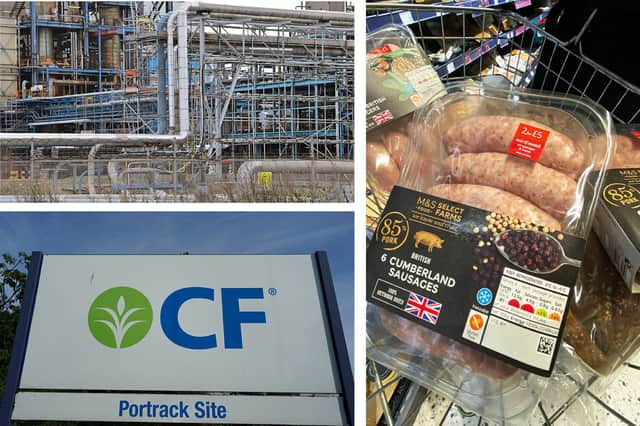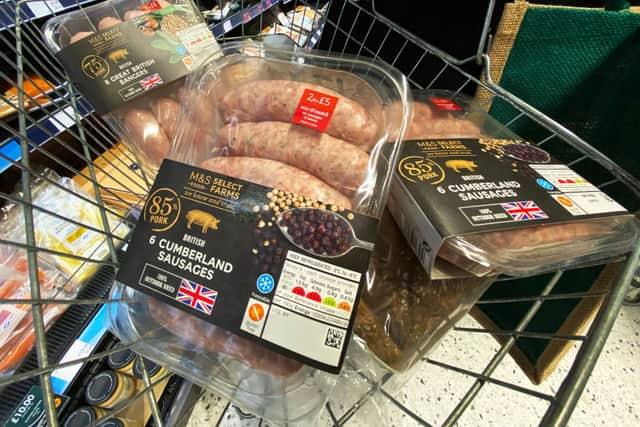Why is there a CO2 supply problem? UK carbon dioxide supply crisis explained as private sector pens new deal
This article contains affiliate links. We may earn a small commission on items purchased through this article, but that does not affect our editorial judgement.


Warnings of potential food and drink shortages hit the headlines again recently after a deal guaranteeing the supply of CO2 expired on 31 January.
While the crisis was averted when the industry signed a new deal to keep a key producer of the gas open, the UK still faces long-term challenges with CO2 supply.
Advertisement
Hide AdAdvertisement
Hide AdCarbon dioxide is key to food and drink production as it allows for the humane slaughter of animals and adds fizz to drinks.
Without it, food and drink production could grind to a halt, while medical operations and nuclear energy could also be affected.
But why is the UK so short of CO2 - and what could happen if there was a shortage of the gas?
Here’s what you need to know.
Why does CO2 matter?
Despite being the gas that has done the most to accelerate climate change, CO2 is also very useful to humans.
Advertisement
Hide AdAdvertisement
Hide AdNot only does it give soft and alcoholic drinks their fizz, but it also stuns animals to allow for their humane slaughter, extends the shelf life of food products, helps surgical operations and cools nuclear power plants.


Without CO2, our food and drink industry and energy supply would grind to a halt.
What has put CO2 supplies in doubt?
The CO2 supply crisis first emerged in September 2021 when US manufacturer CF Fertilisers announced it would have to close its two UK plants due to high natural gas prices.
Fertiliser production creates CO2 as a byproduct, and CF on its own is responsible for around 60% of the UK’s production of food-grade carbon dioxide.
But it is an energy intensive process.


Advertisement
Hide AdAdvertisement
Hide AdThere’s been a worldwide squeeze on gas and energy supplies for the last 12 months, which has pushed prices to record highs.
Reasons behind this squeeze include:
- A cold winter in Europe last year meant more gas than usual was used and supplies were eaten into
- A largely placid summer in 2021 meant we were reliant on gas for our energy, rather than wind power. It meant it became difficult to replenish depleted gas supplies
- Demand from China increased dramatically as the nation sought to get its economy up and running again after Covid-19
Europe has also been hit harder than other parts of the world because it is especially reliant on Russian gas exports, making the current geopolitical situation in Ukraine difficult.
The UK, meanwhile, is one of Europe’s largest users of gas but at the same time has a lower storage capacity than many other European states.
Following warnings in September that CF’s shutdown could lead to food shortages from key industry bodies, like the Food and Drink Federation (FDF), British Poultry Council (BPC) and British Meat Processors Association (BMPA), the Government stepped in.


Advertisement
Hide AdAdvertisement
Hide AdIt signed a three-week deal to subsidise the re-opening and operating costs of one of CF’s plants.
This deal was followed in October 2021 by a CO2 industry agreement to buy CF’s carbon dioxide at a specified price (that wasn’t made public) to ensure it could remain open.
It was this deal that ended on 31 January.
However, the industry signed a new one on 1 February to keep CF’s plant in Billingham, Teesside open.
The deal is for an unspecified period, although the Government suggested it would remain in place for as long as global gas prices were deemed to be high.
What could happen when the CO2 deal ends?
Advertisement
Hide AdAdvertisement
Hide AdOne thing that’s become clear from the most recent episode of the CO2 supply crisis is that the Government has suggested that it will not be getting out its cheque book for another industry bail out, telling NationalWorld: “It is for the CO2 industry to ensure supplies to UK businesses.”


It also said it would like to see the private sector do more to build the UK’s resilience.
There is also a belief in Government that the causes of the crisis in September 2021 were unprecedented and that the UK is in a better position at the current time.
It pointed out that major CO2 producer - Ensus - has come back online, additional imports have been procured and firms with anaerobic digestors have started contributing to UK CO2 supply.
Advertisement
Hide AdAdvertisement
Hide AdHowever, the food industry believes another shortage is on the horizon so long as energy prices remain high, with the FDF calling on the Government to take a more active role in finding a long term solution.
“It is critical that together we ensure supply can continue and that we build long-term resilience into the production of food-grade CO2,” said Kate Halliwell, chief scientific officer at FDF, on 31 January before the latest CO2 deal was signed.
She had warned that the expiration of the previous deal “could lead to shortages in the products we find on our supermarket shelves – adding further pressures to families already coping with high food-price inflation.”
The BMPA told NationalWorld that if CF had shut down again, the UK would have been 25% short of the CO2 it needs.
Advertisement
Hide AdAdvertisement
Hide AdThis shortfall could also grow, it suggested, because there were no guarantees anaerobic digestors would carry on supplying industry “when prices stabilise or come back down”.
It also said there was a “big unknown” about “how long CF will be in the UK for” due to the high production costs here.
When asked by NationalWorld about its future in the UK, CF Industries did not provide a direct answer, saying: “the Billingham Complex remains operational and continues to sell CO2 on a contractual and spot basis.”
The long and short of this saga is that the UK faces the very real prospect of food and drink shortages in the short-to-medium term.
And it has happened before.
Advertisement
Hide AdAdvertisement
Hide AdIn the summer of 2018, England’s World Cup run and an unusually long spell of hot, dry weather, increased demand for carbonated drinks, like beer, and left the UK short of CO2 at a time when most plants that produce the gas were closed for maintenance.
It led to beer taps running dry and production of food items, like Warburtons crumpets, ceasing or running at reduced capacity for a number of weeks.
While the footballing success might not be repeated, there is a very real chance the CO2 crisis might be.
Additional reporting by PA
A message from the editor:
Thank you for reading. NationalWorld is a new national news brand, produced by a team of journalists, editors, video producers and designers who live and work across the UK. Find out more about who’s who in the team, and our editorial values. We want to start a community among our readers, so please follow us on Facebook, Twitter and Instagram, and keep the conversation going. You can also sign up to our email newsletters and get a curated selection of our best reads to your inbox every day.
Comment Guidelines
National World encourages reader discussion on our stories. User feedback, insights and back-and-forth exchanges add a rich layer of context to reporting. Please review our Community Guidelines before commenting.
